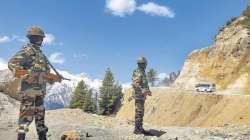Chinese acts on India border meant to take advantage of COVID distractions: US official
The latest Chinese activities with India is similar to Beijing’s past activities on India border including Doklam, Stilwell told reporters during a conference call. “One explanation for (China) creating multiple fronts like this is an assessment in Beijing that the world is distracted and is focused entirely on survival right (now),

China opening multiple fronts like the one on India border maybe because of Beijing’s assessment that the world is distracted due to COVID-19 pandemic and it may advantage of it, a top American diplomat said Thursday. Assistant Secretary for East Asian and Pacific Affairs David Stilwell made the remark, adding the Trump administration is closely watching the Indo-China situation.
The latest Chinese activities with India is similar to Beijing’s past activities on India border including Doklam, Stilwell told reporters during a conference call. “One explanation for (China) creating multiple fronts like this is an assessment in Beijing that the world is distracted and is focused entirely on survival right (now), recovering from the corona pandemic, which then possibly is seen as an opportunity to take advantage of the distraction,” Stillwell said.
“I’m not going to offer an official US Government position on that, but there are numerous explanations out there for that (in the public domain),” he said, responding to a question on the aggressive Chinese behaviour with its neighbours, including India. “What we’re doing, we’re obviously watching the India-China border dispute very closely,” Stillwell said, during the conference call after the Hawaii meeting between Secretary of State Mike Pompeo and top Chinese diplomat Yang Jiechi to exchange views on bilateral relations and coronavirus pandemic.
“This activity is similar to the activity we’ve seen in the past on border disputes with the PRC (Peoples Republic of China), and again, I would point you to those – I think it was 2015 when Xi Jinping travelled to India the first time,” he said. “The PLA (People’s Liberation Army) invaded this contested area deeper and longer, with more people, than ever before historically. Whether that was a negotiating tactic or just a punch in the nose to demonstrate their superiority, I don’t know,” he said. “But then we saw the Doklam issue down near Bhutan, where we saw similar concerns.
I wish I knew. Again, we don’t have a lot of visibility and we don’t have a lot of open dialogue with our Chinese counterparts, and honestly, I’d like to see more of that if we can,” Stillwell said. During the news conference, Stilwell did not confirm if the ongoing Indo-China border clash came up during the Pompeo-Yang talks. But the State Department official did express concern over the recent Chinese behaviour in the region. “The actions that we’ve seen out of the PRC of late -- and you all know this as you watch the beat -- have been not really constructive as we look at India, the South China Sea, Hong Kong issues, and just go around the perimeter.
In the periphery things like trade have not lived up to the billing, unfortunately,” Stillwell said. The US seeks a constructive and result-oriented relationship that is fair and reciprocal with China, he said, adding that implies not just conversations but actions. In addition to talks on areas like North Korea, Pompeo during the meeting insisted on the Chinese disclosing all they know about how this pandemic began, to share all the information that they have that leads to saving lives, he said. “This is not about saving face; it’s about saving lives.
And we insist that they live up to their agreements with the WHO and with the international health regulations to make open as this is beyond politics,” he said. “We have to understand and assess that, as I talk about a constructive and result-oriented relationship, that the words are fine but will be judged by the deeds. If we have words of peace but we have aggressive actions, then we’re going to have to increase the pressure to manage that,” he said.
In this US is not alone, he added. “This is not a US-China event. It’s not a US-China issue. This is China versus lots of others. We just saw a very strong G7 statement on Hong Kong that demonstrates that it’s the world that’s concerned with this behaviour,” he said. “The objective of these talks was to help the Chinese government understand that their actions are actually working against them and that if they come to the table with a reasonable proposal, the US is obviously going to greet it reasonably and look for ways to work toward a positive outcome,” Stillwell said.